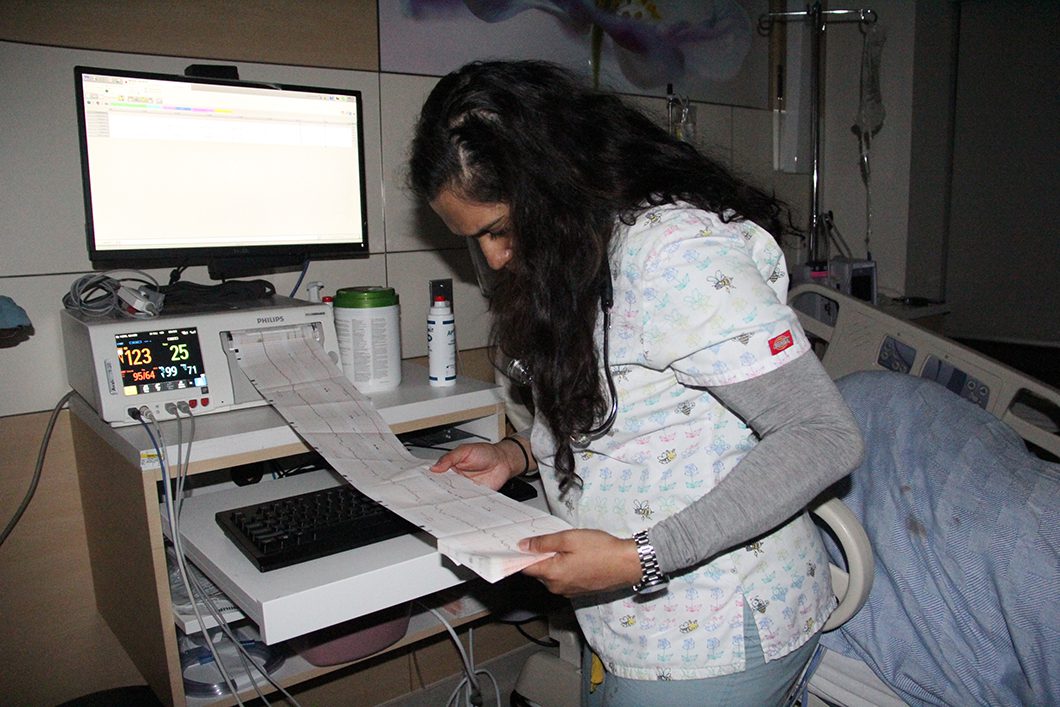Jyothy Nair’s work schedule isn’t like most Torontonians: once every three weeks, she’s on call for every hour of every day of that week.
Nair, 41, has been a midwife for eight years. She works at Diversity Midwives, a clinic located at 10 Bimbrok Rd. in Scarborough. She describes her profession as being a “guardian of normal and low-risk births.”
A big part of her job includes being with clients at 4 a.m. to either help deliver their babies, or to conduct assessments.
According to the Association of Ontario Midwives (AOM), there are 920 midwives in Ontario and they work as “health-care professionals who provide government-funded expert primary care to pregnant people and their newborns.”
Midwives work in small groups to assist parents throughout pregnancy, labour, birth and the first six weeks after the birth of the baby. Although they are registered health-care professionals, midwives are a less popular choice for childbirth compared to obstetricians.
BORN (Better Outcomes Registry and Network) Ontario reported that between 2014 and 2016, nearly 80 per cent of births in Ontario were attended to by an obstetrician, while only 10.1 per cent of births were attended to by a midwife.
Yet, these numbers are changing. According to the same organization, births assisted by a midwife are slowly but steadily increasing.
Before becoming a midwife, Nair worked in information technology at TD Canada Trust. Her interest in pregnancy and childbirth was sparked by the case of a close coworker who became pregnant. Nair says she spent months feeling her friend’s stomach for kicks and talking to her about the pregnancy, but the baby died while her friend was in active labour.
The grief her coworker went through following the stillbirth, and the lack of emotional support she got at the hospital, affected her deeply. After speaking to a midwife in January 2007, Nair learned that midwives care for their patients’ emotional and physical well-being. She decided on the spot that she would become one and applied to the four-year bachelor of health sciences program in midwifery at Ryerson University.
She was promptly accepted.
Part of midwifery includes working “interprofessionally” with OBGYNs, says Nair. This is especially true when dealing with rare, atypical and abnormal pregnancies.
An atypical pregnancy means that the patient remains in the midwife’s care, but requires higher surveillance and doctor oversight. An abnormal pregnancy is when there are serious conditions that require the transference of care of the mother to a doctor.
An example of an atypical condition would be fetal growth issues, while an abnormal condition would be when a pregnant mother has high blood pressure or is expecting twins.
(Story continues below)

“Pregnancy is not a disease … it is a life experience.”
– Jyothy Nair
Midwives often work in tandem with doulas, non-medical birth companions that assist women throughout their pregnancy and aftercare. They are often referred to a client by a midwife or directly hired by the client themselves.
Doulas are not medically trained and are part of an unregulated health profession, but they play an important role in a woman’s birthing team, says Kimberley Fernandez.
Fernandez, 49, a doula for almost 14 years, can often be found working around Toronto and at St. Michael’s Hospital. Fernandez says doulas specialize in “hands-on physical and emotional support specifically for home-births.”
While midwives are covered by the Ontario Health Insurance Plan, all doula services are paid for out-of-pocket.
According to Fernandez, the average cost for a doula is $1,400 to $1,500 and typically includes prenatal visits, two weeks of on-call assistance and birth, breastfeeding help and postpartum visits.
“Some people think if you have a midwife, you don’t need a doula. I think having the two is a great team to put together,” says Fernandez.
Doulas can provide midwives a much-needed rest during long labours, she says.
“I love working with doulas because it helps me help the patient,” adds Nair.
“We provide holistic, emotionally supportive compassionate care for low risk pregnant women,” she says.
Check out more Toronto at 4 a.m. content here!
Online: Toronto Observer
Instagram: @6ix_at_4
Twitter: @6ix_at_4
Facebook: @6ixat4

